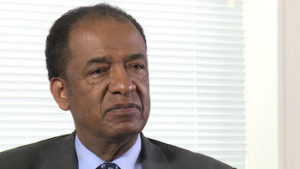
Cleveland Sellers
*Cleveland Sellers was born on this date in 1944. He is a Black educator, administrator, and activist.
Cleveland “Cleve” Sellers Jr. was born to Cleveland Sellers (Sr.) and Pauline Sellers in Denmark, South Carolina. Denmark was a town of mostly black residents, so much so that, as a child, Sellers was often blind to the privilege of whites. He said, "As far as I was concerned, white people didn't constitute a threat or deterrent to anything I wanted to be or accomplish." He began attending the (then) Voorhees School when he was three and served as its mascot. Growing up, Sellers had a great relationship with his parents, especially his mother. He admired her care for the community and said he grew up "under her wing."
He attended Voorhees from ninth through 12th grades, graduating in 1962. During his boyhood, Sellers joined the Boy Scouts of America and attended the 1960 National Scout jamboree in Colorado Springs, Colorado. Although Sellers completed the requirements necessary to become an Eagle Scout, "his paperwork was lost," he was not formally recognized with the honor until December 3, 2007, at 64 years of age, more than four decades after it was earned. Sellers was presented with a historically correct Eagle Scout medal that would have been awarded in the 1960s at a special Eagle Scout Court of Honor at the 2010 Centennial National Scout Jamboree.
His family joined St. Philip's Episcopal Church, where Sellers became enthralled with the sermons and brotherhood he was surrounded by—the murder of Emmett Till when Sellers shook him deeply. Between the murder of Till and a week-long summer retreat with church leaders who discussed racial inequalities in America, Sellers was mobilized about civil rights. Also propelled by the Greensboro sit-ins, Sellers organized a sit-in protest at a Denmark, South Carolina lunch counter. At 15, he was active in the American Civil Rights Movement for the first time.
In 1962, Sellers enrolled in Howard University. After the 1960 protest, Sellers' father had forbidden his son from jeopardizing himself by becoming an activist. Nevertheless, Sellers became involved with the Nonviolent Action Group (NAG), where he met Stokely Carmichael. Carmichael deeply inspired Sellers as he was like-minded and a prominent face of the movement on campus. Carmichael's house became NAG headquarters, where Malcolm X frequented and advocated for students the idea of black nationalism, which often criticized MLK's peaceful and inclusive stance. Although some were reluctant, it was an exciting concept. Right before the March on Washington, Sellers and others supplied signs and food during the march. In 1964, Sellers became involved with the Student Non-Violent Coordinating Committee (SNCC).
He was assigned to Holly Springs, Mississippi, to coordinate voting registration and advocate for the Mississippi Freedom Democratic Party. He and his colleagues were met with intense racism while in Mississippi. When they returned home, they felt beat down and as though nothing had been accomplished. So, when Sellers was elected program director of the SNCC the next year, he revised the organization's goals. Sellers thought the philosophical tactics of the SNCC weren't working, and he instead wanted to implement extremely focused and achievable goals for the group. He believed it to be the best way to make a change. Some members of the SNCC, especially Carmichael, began advocating for black empowerment, specifically, Black Power.
Sellers preached that black power was never meant to undermine white people but was meant to empower and celebrate the black community. Although SNCC ended up having many critics and eventually disintegrating, the concept of black power sent a "wake-up call" to America. It allowed some members of the black community to express feelings of injustice to the community emotionally. Sellers refused to be drafted into the U.S. military as a protest against the Vietnam War. The leadership of SNCC thought that the Johnson Administration was trying to silence SNCC by drafting its leadership. Sellers graduated from Shaw University in 1967. After graduation, he returned to South Carolina, drained from the SNCC.
He was the only person convicted and jailed for events at the Orangeburg Massacre, a 1968 civil rights protest in which state troopers killed three students. After his release from prison, Sellers earned a master's degree from Harvard University in 1970. He ran unsuccessfully for office in Greensboro, North Carolina, while aiding the 1984 presidential campaign of Reverend Jesse Jackson. Sellers earned his Ed.D. in History at the University of North Carolina at Greensboro in 1987. He was the director of the African American Studies Program at the University of South Carolina. His scholarly interests include recording the history of protest tradition, civil rights history, and the experiences of Africans in the Diaspora.
He focuses on the oral history of African Americans who shaped the history of South Carolina, including cultural groupings and the languages of Gullah, Creole, and Geechee. He has also studied African Americans' survival experiences, sometimes recorded in folklore but often unrecorded. Sellers has two sons and a daughter. His youngest son is former South Carolina state Rep. Bakari T. Sellers (born September 18, 1984). In 1989, Seller's parents were aging, and he and his family moved back to Denmark, South Carolina, to be with them. In 2008, Sellers was selected as the 8th president of Voorhees College, where he graduated from high school. In September 2015, Sellers stepped down as president because of a heart condition. During his tenure, he helped increase enrollment.